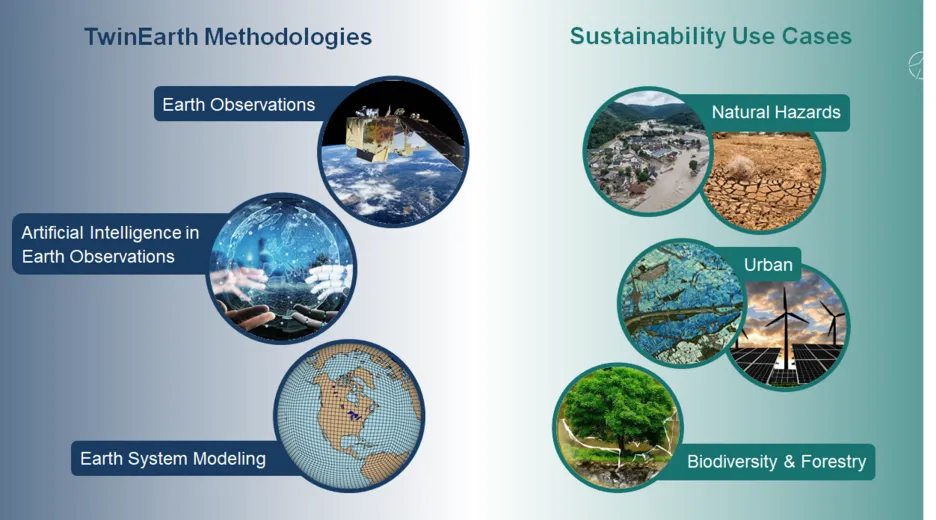EarthCare: Twin Earth Methodologies for Biodiversity, Natural Hazards, and Urbanization
an Innovation Network funded by TUM
Coordinator
Prof. Dr.-Ing. Xiaoxiang Zhu (ED - Data Science in Earth Observation)
The PI team
- Prof. Dr.-Ing. Xiaoxiang Zhu (ED - Data Science in Earth Observation)
- Prof. Dr. Jonathan Bamber (ED - Data Science in Earth Observation)
- Prof. Dr. Niklas Boers (ED - Earth System Modelling)
- Prof. Dr. Markus Disse (ED - Hydrology and River Basin Management)
- Prof. Dr. Thomas Hamacher (ED - Renewable and Sustainable Energy Systems)
- Prof. Dr. Michael Krautblatter (ED - Monitoring, Analysis and Early Warning of Landslides)
- Prof. Dr. Annette Menzel (LS - Ecoclimatology)
- Prof. Dr. Roland Pail (ED - Astronomical and Physical Geodesy)
- Prof. Dr. Anja Rammig (LS - Land Surface-Atmosphere Interactions)
- Prof. Dr. Muhammad Shahzad (ED - Data Science in Earth Observation)
- Prof. Dr. Yuanyuan Wang (ED - Data Science in Earth Observation)
Scientific Goals:
Anthropogenic climate changes pose severe threats to the Earth system, its ecosystems and human society. Effective strategies must be developed to mitigate further adverse changes and adapt to inevitable impacts, particularly the risks arising from an increase in extreme events. In doing so, transformation pathways toward sustainable Earth stewardship urgently need to be identified from global to local scales. The TUM Innovation Network EarthCare is an explorative and interdisciplinary study that bridges the knowledge gap between the use of Artificial Intelligence and Earth observation data for our planet’s sustainability. Under this general goal, EarthCare explores three main directions 1). methodologies for retrieving geoinformation from massive amount of Earth observation data, 2). Methodologies for creating hybrid earth system models of compartments of the Earth by combining machine learning and Earth observation data, and 3). Methodologies and use cases of impact models for decision of sustainability action. The vision of EarthCare is to provide key methodologies for science and policy making for a sustainable future.
Our PI team consists of high profile experts from four disciplines: 1.) Earth observation, 2). AI and data science, 3). Earth system modeling, and 4). Sustainability, which has unique capabilities to unlock the potential of merging highly innovative methods in Earth observation, artificial intelligence, and Earth system modeling with applications in biodiversity and forestry, the urban domain, and climate-induced natural hazards. The cross-cutting framework of EarthCare promotes the exchange between key disciplines of climate science and sustainability, and consolidate the scattered expertise in the Munich area.
Sub-projects:
- Deep Learning for Complex Structures for Modeling Land-atmosphere Interactions (Zhu, Boers)
- Physics aware Machine Learning and Hydrological Modeling (Zhu)
- Deep Learning for quantifying impacts of extreme weather events on vegetation(Boers)
- Uncertainty Estimation of sea-level rise (Zhu, Bamber)
- Tree species monitoring and their resilience to drought stress (Rammig, Buras, Zhu)
- Process-based modeling of European forest drought response (Rammig, Wang)
- Greening and browning - phenology at the vegetation – atmosphere interface (Menzel, Shahzad)
- Citizen Science Nature Watch – keeping an eye on nature and citizens (Menzel, Zhu)
- Impact based drought forecasting with physics-aware machine learning (ML) and Earth Observation (EO) data (Disse, Boers)
- Evaluation of current and future flood risks in West Africa - towards a holistic flood analysis in data-scarce regions (Disse, Zhu)
- Deglaciation and erosion of Alpine landscapes (Pail, Krautblatter)
- Urban Heat Islands (Zhu, Taubenböck)
- Conflict Forecasting using Remote Sensing Data (Zhu, Thurner)
- Forecast the net energy consumption of the build world throughout Europe (Hamacher, Zhu)
- “Cooling Down” - Programme for the Environment and Climate Action (LIFE) (Hamacher, Zhu)
